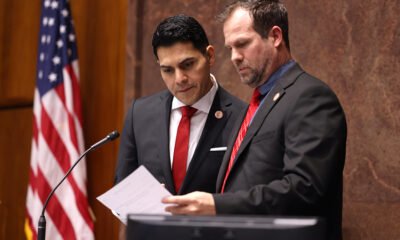2024 Election News
Prop. 140 Sparks Bipartisan Controversy, Leaving Undecided Voters in the Dust

Among the measures on Arizona’s ballot this year, Proposition 140 stands out for drawing both bipartisan support and opposition. This initiative seeks to overhaul the primary election system, introducing open primaries and ranked choice voting.
Typically, political polarization limits collaboration across party lines. However, some Arizona politicians and organizations are coming together to either support or oppose Prop. 140. If passed, the measure would end partisan primaries, allowing all candidates to appear on a single primary ballot and empowering the Legislature to decide how many candidates advance to the general election. In cases with more than two candidates, ranked choice voting would determine the winner.
Supporters include high-profile figures like former Democratic Attorney General Terry Goddard and former Republican state Rep. Rusty Bowers. Additionally, nonpartisan organizations, such as the Center for the Future of Arizona, are backing the effort.
Conversely, notable opponents consist of state Reps. Analise Ortiz from Phoenix and Ben Toma from Glendale. Organizations such as Planned Parenthood Advocates of Arizona and Turning Point Action have also united against Prop. 140.
While Ortiz refrained from commenting on the measure, she recently expressed concerns on social media, labeling it a “bad deal for progressive candidates.” Proponents argue that Prop. 140 aims to attract moderate candidates that better represent the average voter in Arizona.
Chuck Coughlin, a political consultant working with Make Elections Fair Arizona, noted that the opposition seems to be a case of “the enemy of my enemy is my friend.” He explained that the measure targets the elimination of extremism from both parties.
Coughlin stated, “It’s not surprising when we’re trying to put the authority of elections back in voters’ hands, rather than in the two parties’ hands, that the acolytes of those partisan interests are vocalizing their opposition.”
Melina Iyer, co-founder of Civic Engagement Beyond Voting, has reservations about Prop. 140, particularly regarding the power it would bestow upon the Legislature. She accused legislators of passing governance responsibilities back onto voters.
Iyer articulated her skepticism, stating, “I would never trust them with a responsibility like this.” While she supports aspects of the measure, including ranked choice voting, she feels the current proposal could confuse voters.
Coughlin anticipates that the proposal will likely face significant resistance at the polls, in part due to divided opinions among various groups. “We think a good 25 to 30% of the electorate is still undecided on this issue,” he explained.
Complicating matters is another ballot measure, Prop. 133, which seeks to prohibit open primaries in future elections. However, Coughlin remains focused on the prospects for Prop. 140’s success. He aims for it to secure over 50% of the vote to create a path forward.
Regardless of the outcome on November 5, discussions around electoral reforms are likely to continue. Iyer mentioned plans for proponents of ranked choice voting to pursue the issue again in the 2026 ballot, while Coughlin suggested that failure of Prop. 140 could serve as a learning experience for future efforts.
“We’re hoping we’re going to succeed on Election Day and that we will have an opportunity to implement the system and put voters back in charge,” Coughlin concluded.


















